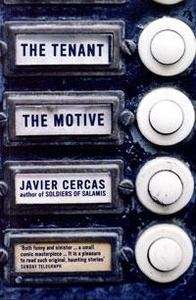The Tenant, The Motive

Editorial Bloomsbury Publishing PLC
Fecha de edición mayo 2006
Idioma inglés
EAN 9780747578970
192 páginas
Libro
encuadernado en tapa blanda
Resumen del libro
Two witty, Kafkaesque novellas by the author of the best-selling Soldiers of Salamis, winner of the 2003 Independent Foreign Fiction Prize.The Tenant and The Motive are two darkly humorous novellas from the award-winning author of Soldiers of Salamis.
The Tenant is the mischievous story of Mario Rota, a linguistics professor whose life starts to unravel after he twists his ankle while out jogging one day. A rival professor appears, takes over his classes and bewitches his girlfriend. Where will Rota's nightmare end and where did it begin?
The Motive is a satire about a writer, Álvaro, who becomes obsessed with finding the ideal inspiration for his novel. First he begins spying on his neighbours, then he starts leading them on, creating a reversal of the maxim that art follows life with some dire consequences. Written with a supremely light touch, these witty novellas are enjoyable masterpieces that linger long in the memory.
Biografía del autor
x{0026}lt;P x{0026}lt;B Javier Cercas x{0026}lt;/B (Ibahernando, Cáceres, 1962) es profesor de literatura española en la Universidad de Gerona, Honorary Fellow de la Universidad de Oxford y profesor honorario de la Universidad Diego Portales, en Chile. Traducida a más de treinta lenguas, su obra consta de las siguientes novelas: x{0026}lt;I El móvilx{0026}lt;/I , x{0026}lt;I El inquilinox{0026}lt;/I , x{0026}lt;I El vientre de la ballenax{0026}lt;/I , x{0026}lt;I Soldados de Salaminax{0026}lt;/I (The Independent Foreign Fiction Prize, Premio Grinzane-Cavour, Premio de la Crítica de Chile, Premio Ciudad de Barcelona, Premi Llibreter, Premio Salambó, entre otros), x{0026}lt;I La velocidad de la luzx{0026}lt;/I (Athens Prize for Literatura, Premio Arzobisto Juan de San Clemente, Premio Fernando Lara, ex aequo), x{0026}lt;I Anatomía de un instantex{0026}lt;/I (Premio Nacional de Narrativa, Premio Internacional Terenci Moix, Premio Mondello Città di Palermo, Prix Jean Moner, Premio Radovan Galonja), x{0026}lt;I Las leyes de la frontera x{0026}lt;/I (Prix Méditérranée Étranger, Premio Correntes d'Escritas, Premio Mandarache), x{0026}lt;I El impostor x{0026}lt;/I (Prix du Libre Europeén, Premio Internazionale Isola D'Elba, Premio Internazionale Ceppo di Pistoia, Premio Arzobispo Juan de San Clemente, Premio Taofen a la mejor novela extranjera publicada en China), x{0026}lt;I El monarca de las sombras x{0026}lt;/I (Prix Malraux), x{0026}lt;I Terra Altax{0026}lt;/I (Premio Planeta y Dagger Prize), x{0026}lt;I Independenciax{0026}lt;/I y x{0026}lt;I El castillo de Barbazul x{0026}lt;/I (Premio Internazionale NordSud). También ha publicado libros misceláneos -x{0026}lt;I Una buena temporadax{0026}lt;/I , x{0026}lt;I Relatos realesx{0026}lt;/I , x{0026}lt;I La verdad de Agamenónx{0026}lt;/I , x{0026}lt;I Formas de ocultarsex{0026}lt;/I , x{0026}lt;I No callarx{0026}lt;/I y x{0026}lt;I La aventura de escribirx{0026}lt;/I - y ensayos: x{0026}lt;I La obra literaria de Gonzalo Suárez x{0026}lt;/I y x{0026}lt;I El punto ciegox{0026}lt;/I . Ha recibido además diversos premios de ensayo y de periodismo, como el Francesco de Sanctis, en Italia, o el Joaquín Romero Murube y el Francisco Cerecedo, en España, así como diversos reconocimientos a toda su carrera, entre ellos el Premio EÑE, en España, el Prix Ulysse o el Prix Dialogo, en Francia, o el Premio Internazionale del Salone del Libro di Torino, el Premio Friuladria, el Premio Internazionale Città di Vigevano o el Premio Sicilia, todos ellos en Italia, , así como el International Literary Flame Award en Montenegro.x{0026}lt;/P








